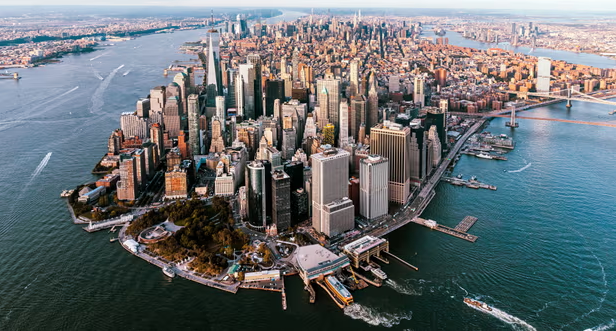||| FROM THE GUARDIAN ||| AT REQUEST OF ORCASONIAN READER
New York City’s crackdown on Airbnb, which was enforced earlier this month, has been described as a “de facto ban” by the company. The tough restrictions, designed to bring back thousands of rental properties to the housing market for city residents to live in, will be closely scrutinised by politicians in cities worldwide. Many argue that Airbnb’s exponential growth – it is now valued at close to $100bn – is a key factor behind the soaring inflation in property prices and rents that is fuelling a global housing crisis. They will be hoping that interventions like New York’s will show them a way to take back cities across mainland Europe and the UK for people who actually live in them.
With more than 6m properties in 100,000 cities rented out through Airbnb, many politicians are beginning to recognise that the huge number of homes lost to short-term lets booked on digital platforms is inextricably linked to the housing crisis. It is further pushing up already unaffordable rents for people living in cities and in tourist areas with large numbers of second homes that are rented out.
The popular perception of Airbnb is of individual hosts looking to rent out a room, or a property while they are away, offering cheap, fun and flexible accommodation in their homes in place of traditional hotels and B&Bs. Research by the US-based Economic Policy Institute (EPI), however, shows that image is wildly out of date, with bookings increasingly concentrated on a small number of professional landlords who act like “miniature hotel companies”. The data and advocacy site Inside Airbnb says: “Airbnb claims to be part of the ‘sharing economy’ and disrupting the hotel industry. However, data shows that the majority of Airbnb listings in most cities are entire homes, many of which are rented all year round – disrupting housing and communities.” It provides a breakdown of the top hosts with multiple listings in cities around the world, including property management companies such as Blueground, which hosts hundreds of homes in New York, Paris, London and Berlin.
Studies show that short-term lets through Airbnb do have a direct impact on rents, with a report from EPI finding that the introduction and expansion of Airbnb in New York may have raised average rents by nearly $400 annually for city residents. Anecdotal evidence about the negative impact on communities across the US and Europe is widespread, with residents complaining that their apartment buildings feel like hotels, with frequent comings and goings, noise, rubbish and poor security. A resident of south London’s new high-end apartment development Elephant Park told me: “There is a lot of Airbnb in our building, it’s hard to say how much but we see a lot of strangers coming in and out, although it’s against the terms of our leases as we’re not allowed to do short-term lets. There are security concerns and they make a lot of noise.









This opinion piece by Anna Minton, the British author of “Big Capital: Who is London for?” is representative of a socialist-cornucopian point of view, that while perhaps emotionally appealing, does not reflect the current reality of life on planet Earth. And even this biased author states at the end of her piece, “The main causes of the global housing crisis can be found not in Airbnb listings, but in the financialisation of housing, which means it is seen primarily as a financial asset rather than a social good.” Utopian dreams are nice to ponder but remember that ‘utopia’ literally means ‘nowhere’.
The real issue with rental housing everywhere is property values and construction costs have increased faster than wages and that is a direct result of population increase through birthrates or immigration; more people looking for jobs lowers market wages and more people looking for housing increases property values and thus market rents.
Out of 41 houses for sale on Orcas island this morning, there are 9 priced under $1 million, 15 over $2 million and 4 over $5 million. The most affordable house is offered at $645k for a 4 bedroom manufactured home on a half acre in Eastsound. With 10% down ($64,500) that leaves a mortgage of $580,500. Current interest rates are 7% or more. That results in a monthly payment of $3862.08 (plus taxes, plus insurance, plus utilities, plus maintenance, etc.) If you cannot document $150k+ per year income, you won’t be able to qualify for that loan. And that is the least expensive house on Orcas.
But by all means, tell us again how a few airbnbs are causing the global housing shortage . . .
Spoken like a true real-estate salesman, and owner of multiple vacation rentals that you are. You can continue to misframe the reality of the moment and believe that if you want Ken, but I don’t.
“But by all means, tell us again how a few airbnbs are causing the global housing shortage . . .” I can tell you, again, and again, and again, and again….
The continued over-promotion of SJC by the Visitors Bureau over the years has been responsible for an astronomical rise in the number of Airbnb’s in the county, (to the point where the county finally, and wisely, adopted limits). Airbnb’s have always been a primary driver of tourism related growth (2nd homes and vacation rentals), both of which are major contributing factors leading to the hot housing market that we see in SJC today.
The result of this is obvious and is reflected in the crash of SJC’s home rental market, the increase in housing prices that we’re seeing today, the appearance of outside investors (such as Oprah Winfrey), a significant loss of affordable housing for workers, an influx of off-island contractors, and many other factors negatively affecting the quality of life for many who live here.
Suggesting that the proliferation of vacation rentals in the last 10 years has not been one of the major contributing factors in the escalation of home prices in San Juan County, leading to the bottom falling out of our rental market and negatively affecting the quality of life of many in San Juan County, is a bit like saying that the proliferation of dams over time in the Pacific NW had nothing to do with the loss of salmon, and the resultant decline in the quality of life of our once-resident Orcas population.
Correction: the least expensive home on Orcas is priced at $685,000 not the $645,000 I stated.
As usual, Michael, you have nothing to add but ad hominem attacks and fact-free statements repeated, “again, and again, and again, and again….”
I think it is indisputable that home prices in SJC are increasingly out of reach of most working people. This is also true everywhere else in Washington. Since we don’t actually live in a socialist workers utopia but rather in a capitalist economic system, the value of any parcel of real estate is determined by what a willing buyer will pay a willing seller. That’s it. As long as there are more people that want to buy than there are properties to buy, the prices will continue to go up. There is literally nothing a realtor can do to increase or decrease property values. If you think otherwise, I suggest you give it a try. Blaming realtors for increasing property values makes no more sense than blaming a car salesman for high automobile prices.
Rental prices are obviously directly tied to real estate values. No one in their right mind is going to buy a house with a $4000 mortgage and rent it out for half that. Blaming local Airbnb hosts for rental prices being high is not only disingenuous, it is counter productive to actually addressing the real issue, which is the disparity between local real estate values and wages.
Supply and Demand are what set prices; including rentals. But I guess trying to scapegoat me and Oprah is easier than coming up with any ideas that might actually work, right Michael?
What you really mean is, “as usual you don’t have anything to say that I want to hear.” Those who promote it bring it.
And what is the end-run of our today’s capitalistic “as much as the market can bear” society–
“The Great Taking”: How they can own it all
“’You’ll own nothing and be happy’? David Webb has gone through the 50-year history of all the legal constructs that have been put in place to technically enable that to happen.” [Oct 2 interview titled “The Great Taking: Who Really Owns Your Assets?”]
The derivatives bubble has been estimated to exceed one quadrillion dollars (a quadrillion is 1,000 trillion). The entire GDP of the world is estimated at $105 trillion, or 10% of one quadrillion; and the collective wealth of the world is an estimated $360 trillion. Clearly, there is not enough collateral anywhere to satisfy all the derivative claims. The majority of derivatives now involve interest rate swaps, and interest rates have shot up. The bubble looks ready to pop.
Who were the intrepid counterparties signing up to take the other side of these risky derivative bets? Initially, it seems, they were banks –led by four mega-banks, JP Morgan Chase, Citibank, Goldman Sachs and Bank of America. But according to a 2023 book called The Great Taking by veteran hedge fund manager David Rogers Webb, counterparty risk on all of these bets is ultimately assumed by an entity called the Depository Trust & Clearing Corporation (DTCC), through its nominee Cede & Co. (See also Greg Morse, “Who Owns America? Cede & DTCC,” and A. Freed, “Who Really Owns Your Money? Part I, The DTCC”). Cede & Co. is now the owner of record of all of our stocks, bonds, digitized securities, mortgages, and more; and it is seriously under-capitalized, holding capital of only $3.5 billion, clearly not enough to satisfy all the potential derivative claims. Webb thinks this is intentional.
What happens if the DTCC goes bankrupt? Under The Bankruptcy Abuse Prevention and Consumer Protection Act (BAPCPA) of 2005, derivatives have “super-priority” in bankruptcy. (The BAPCPA actually protects the banks and derivative claimants rather than consumers; it was the same act that eliminated bankruptcy protection for students.) Derivative claimants don’t even need to go through the bankruptcy court but can simply nab the collateral from the bankrupt estate, leaving nothing for the other secured creditors (including state and local governments) or the banks’ unsecured creditors (including us, the depositors). And in this case the “bankrupt estate” – the holdings of the DTCC/Cede & Co. – includes all of our stocks, bonds, digitized securities, mortgages, and more.
It sounds like conspiracy theory, but it’s all laid out in the Uniform Commercial Code (UCC), tested in precedent, and validated by court rulings. The UCC is a privately-established set of standardized rules for transacting business, which has been ratified by all 50 states and includes key provisions that have been “harmonized” with the laws of other countries in the Western orbit. The UCC makes boring reading and is anything but clear, but Webb has diligently picked through the obscure legalese and demonstrates that the amorphous “they” have it all locked up. They can take everything in one fell swoop, without even going to court. Ideally, we need to get Congress to modify some laws, beginning with the super-priority provisions of the Bankruptcy Law of 2005. Even billionaires, notes Webb, are at risk of losing their holdings; and they have the clout to take action.
About The Great Taking and Its Author
As detailed in the introduction, “David Rogers Webb has deep experience with investigation and analysis within challenging and deceptive environments, including the mergers and acquisitions boom of the 80’s, venture investing, and the public financial markets. He managed hedge funds through the period spanning the extremes of the dot-com bubble and bust, producing a gross return of more than 320% while the S&P 500 and the NASDAQ indices had losses. His clients included some of the largest international institutional investors.”
A lengthy personal preface to the book not only establishes these bona fides but tells an interesting story concerning his family history and the rise and fall of his home city of Cleveland in the Great Depression.
As for what the book is about, Webb summarizes in the introduction:
It is about the taking of collateral (all of it), the end game of the current globally synchronous debt accumulation super cycle. This scheme is being executed by long-planned, intelligent design, the audacity and scope of which is difficult for the mind to encompass. Included are all financial assets and bank deposits, all stocks and bonds; and hence, all underlying property of all public corporations, including all inventories, plant and equipment; land, mineral deposits, inventions and intellectual property. Privately owned personal and real property financed with any amount of debt will likewise be taken, as will the assets of privately owned businesses which have been financed with debt. If even partially successful, this will be the greatest conquest and subjugation in world history.
You might have to read the book to be convinced, but it is not long, is available free on the Net, and is heavily referenced and footnoted. I will try to summarize his main points, but first a look at the derivatives problem and how it got out of hand.
The Derivative Mushroom Cloud
A “financial derivative” is defined as “a security whose value depends on, or is derived from, an underlying asset or assets. The derivative represents a contract between two or more parties and its price fluctuates according to the value of the asset from which it is derived.”
Warren Buffett famously described derivatives as “weapons of financial mass destruction,” but they did not start out that way. Initially they were a form of insurance for farmers to guarantee the price of their forthcoming crops. In a typical futures contract, the miller would pay a fixed price for wheat not yet harvested. The miller assumed the risk that the crops would fail or market prices would fall, while the farmer assumed the risk that prices would rise, limiting his potential profit.
In either case, the farmer actually delivered the product, or so much of it as he produced. The derivatives market exploded when speculators were allowed to bet on the rise or fall of prices, exchange rates, interest rates and other “underlying assets” without actually owning or delivering the “underlying.” Like at a race track, bets could be placed without owning the horse, so there was no limit to the potential number of bets. Speculators could “hedge their bets” by selling short — borrowing and selling stock or other assets they did not actually own. It was a form of counterfeiting that not only diluted the value of the “real” stock but drove down the stock’s price, in many cases driving the company into bankruptcy, so that the short sellers did not have to cover or “deliver” at all (called “naked shorting”). This form of gambling was allowed and encouraged due to a number of regulatory changes, including the Commodity Futures Modernization Act of 2000 (CFMA), repealing key portions of the Glass-Steagall Act separating commercial from investment banking; the Bankruptcy Law of 2005, guaranteeing recovery for derivative speculators; and the lifting of the uptick rule, which had allowed short selling only when a stock was going up.
Enter the DTC, the DTCC and Cede & Co.
In exchange-traded derivatives, a third party, called a clearinghouse, ensures that the bets are paid, a role played initially by the bank. And here’s where the UCC and the DTCC come in. The bank takes title in “street name” and pools it with other “fungible” shares. Under the UCC, the purchaser of the stock does not hold title; he has only a “security entitlement”, making him an unsecured creditor. He has a contractual claim to a portion of a pool of shares held in street name, assuming there are any shares left after the secured creditors have swept in. Webb writes:
In the late 1960’s, something called the Banking and Securities Industry Committee (BASIC) had been formed to find a solution to the “paperwork crisis.” It seemed the burdens of handling physical stock certificates had suddenly become too great, so much so, that the New York Stock exchange had suspended trading some days. “Lawmakers” then urged the government to step into the process. The BASIC report recommended changing from processing physical stock certificates to “book-entry” transfers of ownership via computerized entries in a trust company that would hold the underlying certificates “immobilized.”
Thus was established the Depository Trust Company (DTC), which began operations in 1973, after President Nixon decoupled the dollar from gold internationally. The DTC decoupled stock ownership from paper stock certificates. The purchasers who had put up the money became only “beneficial owners” entitled to interest, dividends and voting rights, leaving title of record in the DTC. The Depository Trust and Clearing Corporation (DTCC) was established in 1999 to combine the functions of the DTC and the National Securities Clearing Corporation (NSCC). The DTCC settles most securities transactions in the U.S. Title of record is with DTC’s nominee Cede & Co. Per Wikipedia:
Cede and Company (also known as Cede and Co. or Cede & Co.), shorthand for “certificate depository”, is a specialist United States financial institution that processes transfers of stock certificates on behalf of Depository Trust Company, the central securities depository used by the United States National Market System, which includes the New York Stock Exchange, and Nasdaq.
Cede technically owns most of the publicly issued stock in the United States. Thus, most investors do not themselves hold direct property rights in stock, but rather have contractual rights that are part of a chain of contractual rights involving Cede. Securities held at Depository Trust Company are registered in its nominee name, Cede & Co., and recorded on its books in the name of the brokerage firm through which they were purchased; on the brokerage firm’s books they are assigned to the accounts of their beneficial owners. [Emphasis added.]
Greg Morse notes that the dictionary definition of “cede” is to “relinquish title.” For more on “beneficial ownership,” see the DTCC website here.
“Harmonizing” the Rules
The next step in the decoupling process was to establish “legal certainty” that the “anointed” creditors could take all, by amending the UCC in all 50 states. This was done quietly over many years, without an act of Congress. The key facts, notes Webb, are these:
Ownership of securities as property has been replaced with a new legal concept of a “security entitlement”, which is a contractual claim assuring a very weak position if the account provider [bank/clearing agent] becomes insolvent.
All securities are held in un-segregated pooled form. Securities used as collateral, and those restricted from such use, are held in the same pool.
All account holders, including those who have prohibited use of their securities as collateral, must, by law, receive only a pro-rata share of residual assets.
“Re-vindication,” i.e. the taking back of one’s own securities in the event of insolvency, is absolutely prohibited.
Account providers may legally borrow pooled securities to collateralize proprietary trading and financing.
“Safe Harbor” assures secured creditors priority claim to pooled securities ahead of account holders.
The absolute priority claim of secured creditors to pooled client securities has been upheld by the courts.
The next step was to “harmonize” the laws internationally so that there would be no escape, at least in the Western orbit. Webb learned this by personal experience, having moved to Sweden to escape, only to have Swedish law subsequently “harmonized” with the “legal certainty” provisions of the UCC.
“Safe Harbor” in the Bankruptcy Code
The last step was to establish “safe harbor” in the 2005 Bankruptcy Code revisions – meaning “’safe harbor’ for secured creditors against the demands of customers to their own assets.” Webb quotes from law professor Stephen Lubben’s book The Bankruptcy Code Without Safe Harbors:
Following the 2005 amendments to the Code, it is hard to envision a derivative that is not subject to special treatment. The safe harbors cover a wide range of contracts that might be considered derivatives, including securities contracts, commodities contracts, forward contracts, repurchase agreements, and, most importantly, swap agreements. …
The safe harbors as currently enacted were promoted by the derivatives industry as necessary measures . . . The systemic risk argument for the safe harbors is based on the belief that the inability to close out a derivative position because of the automatic stay would cause a daisy chain of failure amongst financial institutions. The problem with this argument is that it fails to consider the risks created by the rush to close out positions and demand collateral from distressed firms. Not only does this contribute to the failure of an already weakened financial firm, by fostering a run on the firm, but it also has consequent effects on the markets generally . . . the Code will have to guard against attempts to grab massive amounts of collateral on the eve of a bankruptcy, in a way that is unrelated to the underlying value of the trades being collateralized.
A number of researchers have found that super-priority in bankruptcy for derivatives actually increases rather than decreases risk. See e.g. a National Bureau of Economic Research paper called “Should Derivatives be Privileged in Bankruptcy?” Among other hazards, super-priority has contributed to the explosion in speculative derivatives, threatening the stability of national and global markets. For more on this issue, see my earlier articles here and here.
What to Do?
Webb does not say much about solutions; his goal seems to be to sound the alarm. What can we do to protect our assets? “Probably nothing,” he quoted a knowledgeable expert in a recent webinar. “We just have to stop them.” But he did point out that even the assets of the wealthy are threatened. If the issue can be brought to the attention of Congress, hopefully they can be motivated to revise the laws. Congressional action could include modifying the Bankruptcy Act of 2005 and the UCC, taxing windfall profits, imposing a financial transaction tax, and enforcing the antitrust laws and Constitutional property rights. As for timing, Webb says just the movement in interest rates, from 0.25% to 5.5%, should have collapsed the market already. He thinks it is being held up artificially, while “they” get the necessary systems in place.
Where to save your personal monies? Big derivative banks are risky, and Webb thinks credit unions and smaller banks will go down with the market if there is a general collapse, as happened in the Great Depression. Gold and silver are good but hard to spend on groceries. Keeping some emergency cash on hand is important, and so is growing your own food if you have space for a garden. Short-term Treasuries bought directly from the government at Treasury Direct might be the safest savings option, assuming the government doesn’t wind up in bankruptcy itself.
Meanwhile, we need to design an alternative financial system that is equitable and sustainable. Promising components might include publicly-owned banks, product-backed community cryptocurrencies, a land value tax, and a financial transaction tax.
A neoliberal, financialized economy of the sort we have today produces little and leaves the workers in debt. Goods and services are produced by the “real” economy; finance is just superstructure. Derivatives do not now produce even the security for which they were originally intended. A healthy, enduring economy must produce real things and exchange them fairly for the wages earned by labor.
Ellen Brown is an attorney, chair of the Public Banking Institute, and author of thirteen books including Web of Debt, The Public Bank Solution, and Banking on the People: Democratizing Money in the Digital Age. She also co-hosts a radio program on PRN.FM called “It’s Our Money.” Her 400+ blog articles are posted at EllenBrown.com.
“As usual, Michael, you have nothing to add but ad hominem attacks and fact-free statements repeated, “again, and again, and again, and again….”
What you really mean is, “As usual, Michael, you have nothing to say that I want to hear.”